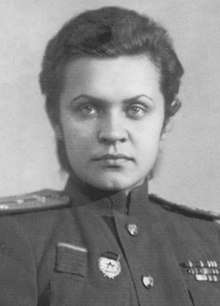Irina Levchenko
Irina Nikolaevna Levchenko (Russian: Ирина Николаевна Левченко; 15 March 1924 – 8 January 1973) was a tank commander in the Red Army during the Second World War. For her actions during the war, she was made a Hero of the Soviet Union in 1965.[1]
Irina Nikolaevna Levchenko | |
|---|---|
 | |
| Native name | Ирина Николаевна Левченко |
| Born | March 15, 1924 Kadievka, Ukrainian SSR, Soviet Union |
| Died | January 18, 1973 (aged 48) Moscow, Russia SFSR, Soviet Union |
| Buried | |
| Allegiance | |
| Service/ | Red Army |
| Years of service | 1941–1958 |
| Rank | Lieutenant colonel |
| Battles/wars | Battle of Moscow |
| Awards | Hero of the Soviet Union Florence Nightingale Medal |
Early life
Irina Nikolaevna Levchenko was born in Kadievka, Voroshilovgrad oblast, on 15 March 1924. She was the granddaughter of Maria Zubkova-Saraeva, who was awarded Order of the Red Banner for service during the Russian Civil War. Levchenko's father was killed in the 1930s under the regime of Joseph Stalin, having previously been the Soviet Minister for Transport Construction.[2][3][4]
World War II career
When Levchenko initially joined the military, she was assigned to a first-aid platoon where she first entered combat on 6 July 1941 near Smolensk as a medic. She was injured during the Battle of Moscow, and after she recovered was sent as a non-commissioned officer to the 39th Tank Brigade. She was initially trained in the use of the T-60 tank. After a second injury, she was enrolled at the Stalingrad Tank School. She was injured for a third time after being placed as a tank platoon commander near Smolensk.[2]
Levchenko was then posted as platoon commander of the 41st Tank Brigade on the Ukrainian Front. With her Brigade, she advanced through Eastern Europe and was wounded again near Budapest. She returned to the war on the Belorussian Front as a tank corps liaison officer, and was near to Berlin when the war ended.[4]
Later life
Levchenko attended the reunion of veterans near the Elbe in 1945. In 1952, she graduated from an engineering course at the Academy of Armored and Mechanized Troops in Moscow. Following achieving a history degree at the Frunze Military Academy, she transferred to the reserves. Levchenko joined the Soviet Writers' Union, and ended her military service as a Lieutenant colonel. She died on 18 January 1973, and was buried in the Novodevichy Cemetery.[2]
Awards and recognition
Levchenko was the first Russian to receive the Florence Nightingale Medal of the International Red Cross. She was made a Hero of the Soviet Union on 6 May 1965 and had received three Orders of the Red Star.[2][3]
See also
References
- Sakaida, Henry (2012-04-20). Heroines of the Soviet Union 1941–45. Bloomsbury Publishing. ISBN 9781780966922.
- Pennington, Reina; Higham, Robin (2003). Amazons to Fighter Pilots: A Biographical Dictionary of Military Women. 1. Westport, CT: Greenwood Press. pp. 256–257. ISBN 978-0-313327-070.
- Cook, Bernard A. (2006). Women and War: A Historical Encyclopedia from Antiquity to the Present. 1. Santa Barbara, California: ABC Clio. p. 554. ISBN 978-1-851097-708.
- "Левченко Ирина Николаевна". www.warheroes.ru. Retrieved 2018-05-06.